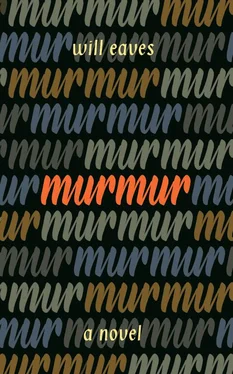Time to dismount… but I have not retrieved my spear.
I think to pull it free as I jump down, whooping, but it is lodged fast by its fashioned teeth. My feet slide forward and I fall—too near to my conquest.
The mammoth rolls on top of me. My body’s contents flood my mouth.
My clansmen drag me out and I can dimly understand their conference. There is a ritual to observe, a truth that comprehends my loss. I must be buried with my prey. I know that I am crushed. They think that I am dead, but I am still alive. I lie on the savannah, listening to the sound of flints, watching the stars come out.
The sky and constellations form an insect eye in negative.
It takes all night to quarter him and drag us harrowingly far, in pieces, up the slope, over the treachery of path and fissure, to the cave. We will be taken deep into the cliff. The cave’s bone pit honors us both. Like chiefs, we wear its stones.
*
Now she is talking to me and I want to say I can’t remember who you are. I can’t remember, but I do notice the room acquiring light and shade. The gloss paint on the windowsill shines bright or else goes gray whenever her words touch the wall. The wooden desk is to the right of the window, tucked into a corner. The drawers have cupped handles of brass. Its surface is red leather, strewn with calculations, and an odd device sits in the middle, pupating. It shifts inside a sort of sac—cube, tile, tendril, and bead—sweetbreads, or food not dead. A meal come back life.
“They’re doing what you said, Alec,” she says. “It’s all about the ‘how’ they get you stable, how they know you’re done for, how I’ll manage, how it’s going to be. It’s like an interview.” She stops and makes the walls shiver. I see shoulders—I think I see shoulders moving. “‘How would you cope? How would you pay for that?’ Nothing about the who—the who is left. To deal with this. Who I am talking to. Who will be left. What will be left of you. I can’t just sit here… saying stuff.”
The shifting sac puts out a glistening mimetic limb. Some evolutionary leap from pseudopodium to flower takes place. It is a vascular crysanth in wet plastic.
“Fucking flowers. Not mine. I ought to say nice things.” She stops. “And all I want to do is tell you—”
Then I miss a crucial bit, because the flowers from the filling station have become a bonsai carboniferous forest, and died. A slimy jaw breaks through the gastrodermal shell on my work desk, a primitive eel. There! Watch it go! Madly familiar in its fast flick-flack agitations, knocking something to the floor—a mug.
“—although you know I do. Talking to you is like talking to her, someone who can’t say what she thinks, if she can think at all…”
The silence puts its hand on her stomach.
“I’m so angry with you. I can’t say, ‘Here we are. Flowers, your mug.’ That’s what they have in mind. Alec. That’s what the doctors think will bring you back. I can’t do it. I won’t say mindless things. How could— what have you done? We never even— how has this happened? ” The mirror sticks out its glass throat. “Before we were married, in Canada, I had my doubts. I’ve never said. I never minded very much about the rest. If you can hear me, this is what I remember.”
The wall is running with moisture.
“I had to get that plane and we were in the hotel, in that awful twin-bed room. You didn’t want to come downstairs. I had to say, ‘I’m going now.’”
The condensation in the room recalls a winter window, yellow and opaque. Behind it, as you pass by in the street, families argue, laugh, and children dangerously imitate their parents’ tone of voice.
“And you were going to stay there, in the room, and not come down to see me off. I had to say . My heart was thumping and you must have seen. I had to tell you what to do, and you looked blank, like you do now. Oh Christ. You haven’t any idea.”
She really laughs at that, then hides her face.
The how of life is unconscious, a kinesis switched on or off. The what is giving birth to live young in the corner—learning who it is and furnishing its own sensorium, the room of life—before the equations open and close the door and everything is how it is outside, and dark, with no more light.
*
Now it is growing cold. My family go south and die.
The golden teardrop of the cave’s entrance freezes, and there is only crystal day, fading, the mountains and the plain and air covered by ice. I sleep. It is a long and measureless winter. Eventually the thaw begins. Bulldozed material piles up outside the cave during the melt. The sun is not so much altered, but kindlier and seasonal as misfit streams burst through a new ravine, carved from the plain, and wash the glacial moraine away. The age of pole-flints, scrub, and tundra disappears. The sea rises. Forests of birch and alder move in, rivers, coastal settlements appear—people at rest.
A show is anything that happens on a stage.
A man hunts deer and has good teeth. His people set up fishing camps, their huts have frames of branches bound together by tree bark, the roofs are hide. Sometimes the sea thrashes about for days, and then the people take revenge, staying at home to whittle harpoons from their antlers, seasoning the tips in fire and working them into a point. The tempered weapons smell of hair. The animal’s backstrap is cut out and its fibers used to sew the people’s clothes. There are so few of them, the men, the women, and their silent gazing young. Five thousand in this cold peninsula.
They know my cave but have not found my bones. The people move with the solstice. Wild men, exiles, turn up and spend thin evenings watching fire, breaking mussels, tracing a map in the ashes to work out where they’ll be the day after, next moon, next year; or drawing a rabbit. Those ears! One year the fishermen capture a stag. The shaman in the tribe works holes into its cranium, to which he fixes painted hide, a headdress that transforms the man into a mutable creature, man, animal, insect, and tree. He dives into creation to meet fear.
He sees and does not speak. He feels the land changing its shape.
The world has fallen, far beyond the northern limits of vision. Across the country, many strides, the place of strange tongues, trade and encounter; the great cord tying everyone to the unknowable beyond has come undone. An inundation at first light. The shaman can hear voices raised in powerless alarm. He looks into a sea-fed pool, ripples of something he cannot explain. The elder’s son arrives shouting to interrupt his sense-making. The boy’s shadow darkens the pool, his hunting pouch brimful of shells to show the magician. The shaman watches the shadow and feels a deep cold pain, as of a person drowning, shocked into a total clarity of being with the seawater rocking at eye level, then nothing more.
He knows that other boys have become shells themselves.
A wave has swept those shadow-lives away and cut the cord: all this is written in the pool’s lichens, its crustaceans and kelp. A bigger push of water overfills the pool and from their nursery the little crabs are lifted and expelled.
A few survivors in the East—one child, women, and elders who were garnering in the wood—know they have lost their grip on order in the world. They ask their own shaman, their shadow-magician, for saving lore and guiding prophecy, but prophecy is not advice. It cannot save. You can’t escape its fulfillment because it’s you, and how it is to have a life, which is to leave it wondering.
Consider these events proceeding from that long, arduous fight with the mammoth, the cosmic flickering of causes and effects, glimpsed in the last second of how it was to be a hunter in the Pleistocene—leaving, well, what?
Читать дальше












